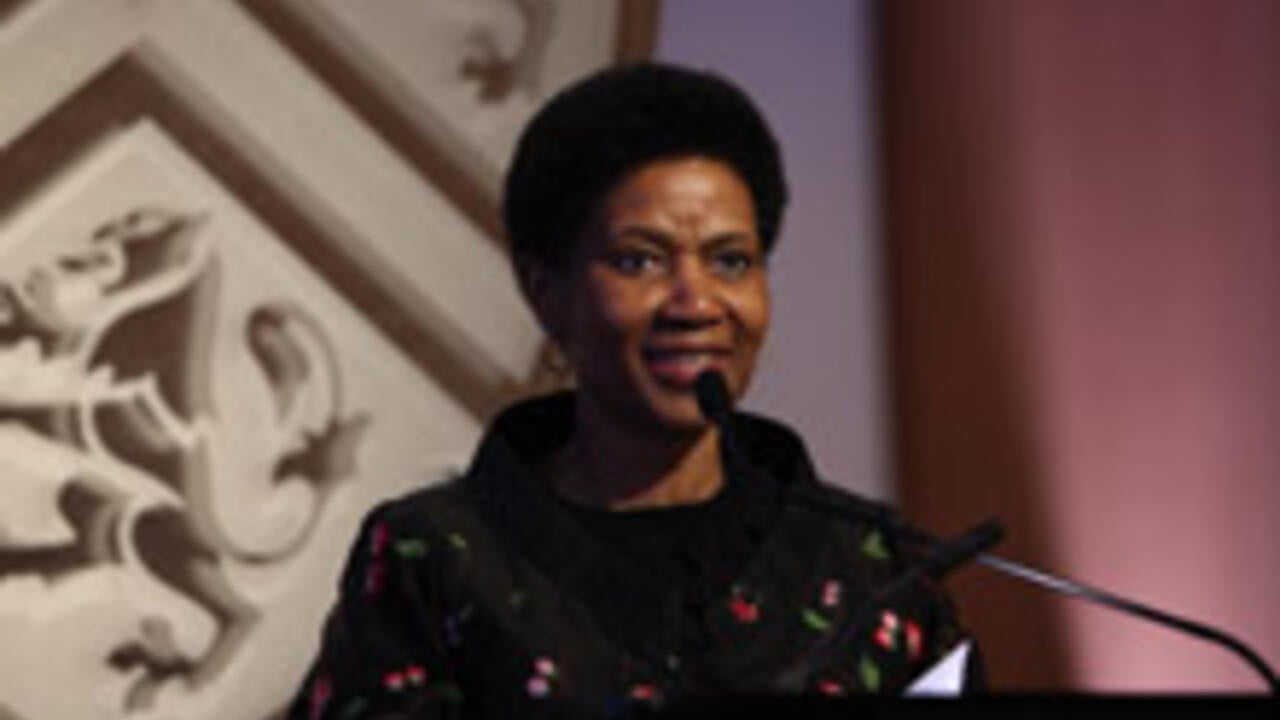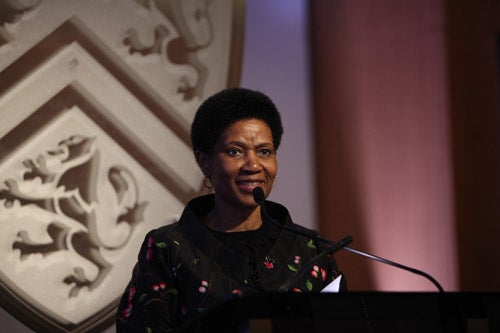
Head of UN Women calls Waterloo pioneer in gender equity
“We are targeting men and boys to ensure that . . . when they are parents and part of institutions, they will not be threatened by women.”

“We are targeting men and boys to ensure that . . . when they are parents and part of institutions, they will not be threatened by women.”
By Beth Gallagher University Relations The head of UN Women called on students to get involved in the fight for gender equity telling them: “It’s not about shortchanging men. It’s about creating a world where men and women can stand shoulder to shoulder.”
The head of UN Women called on students to get involved in the fight for gender equity telling them: “It’s not about shortchanging men. It’s about creating a world where men and women can stand shoulder to shoulder.”
United Nations Under-Secretary-General Phumzile Mlambo-Ngcuka, the executive director of UN Women told a gathering at the University of Waterloo that global gender equity can only happen when a “critical mass of activists help bring about change.
“We are targeting men and boys to ensure that the next generation of men and boys grow up to be activists, to be equality-oriented, to make sure that when they have authority and responsibility, when they are parents and part of institutions, they will not be threatened by women,” she said.
Mlambo-Ngcuka delivered a public address on campus to mark the first anniversary of the University of Waterloo’s involvement in the United Nation Women’s HeForShe IMPACT 10x10x10 initiative.
Mlambo-Ngcuka called the University a pioneer for its work as a HeForShe IMPACT 10x10x10 champion and its leadership in the area of transgender rights. Recently, Waterloo led a province-wide initiative to allow students to register as “another gender identity” instead of male or female. “This is truly pioneering and we are proud to be associated with you,” said Mlambo-Ngcuka.
Feridun Hamdullahpur, president and vice-chancellor, of the University of Waterloo, took the opportunity to announce that nearly one-third of the incoming engineering students this fall are women, the highest number in the university's history.
“These are strong, early steps on a long, important journey, said Hamdullahpur. “Until girls and women see the fullness of their reflection in the University of Waterloo, in our student body, and in our faculties, there is more work to do.”
In her address, Mlambo-Ngcuka highlighted the UN’s 2030 Agenda for Sustainable Development pointing out there are still more than 100 countries in the world that have laws that prohibit women from inheriting and owning property. She said the UN Agenda addresses issues like violence against women, reproductive and sexual rights and unpaid care work. Mlambo-Ngcuka said it will take 50 years to achieve equal participation of women in politics and more than 100 years to reach wage equity.
“Programs such as HeForShe are helping us shorten the time for us to address these issues,” she said.
Mlambo-Ngcuka spearheaded the 2014 introduction of the HeForShe campaign, a global effort to engage men and boys in removing the social and cultural barriers that prevent women and girls from achieving their potential, and positively reshaping society.
In responding to a question after her address, Mlambo-Ngcuka said:
“For a little boy, the best teacher about gender equality is going to be his dad. Children learn by what they see, not what they are told. If all our dads had played that role throughout history we’d definitely have a different world.”
Mlambo-Ngcuka has worked in government and civil society, and with the private sector, and was actively involved in the struggle to end apartheid in her home country of South Africa.
The anniversary address is only the latest in a number of recent HeForShe initiatives, including the launch of a new HeForShe website. The site will be a hub for community updates, news items, faculty blogs, and other initiatives relating to Waterloo’s HeForShe campaign.
Additionally, earlier this year the HeForShe campaign announced eight new grants of up to $10,000 to support research that investigates and addresses gender equity with preference to projects that advance the University’s three IMPACT 10x10x10 commitments or that have a demonstrated relevance to Waterloo. Applications are due June 30.
As part of the HeForShe IMPACT 10x10x10 initiative, Waterloo will:

Read more
Here are the people and events behind some of this year’s most compelling Waterloo stories

Read more
Meet five exceptional Waterloo graduate students crossing the convocation stage as Class of 2025 valedictorians

Read more
As we prepare to celebrate Fall 2025 convocation this week, I would like to extend my heartfelt congratulations to our class of 2025.
The University of Waterloo acknowledges that much of our work takes place on the traditional territory of the Neutral, Anishinaabeg, and Haudenosaunee peoples. Our main campus is situated on the Haldimand Tract, the land granted to the Six Nations that includes six miles on each side of the Grand River. Our active work toward reconciliation takes place across our campuses through research, learning, teaching, and community building, and is co-ordinated within the Office of Indigenous Relations.